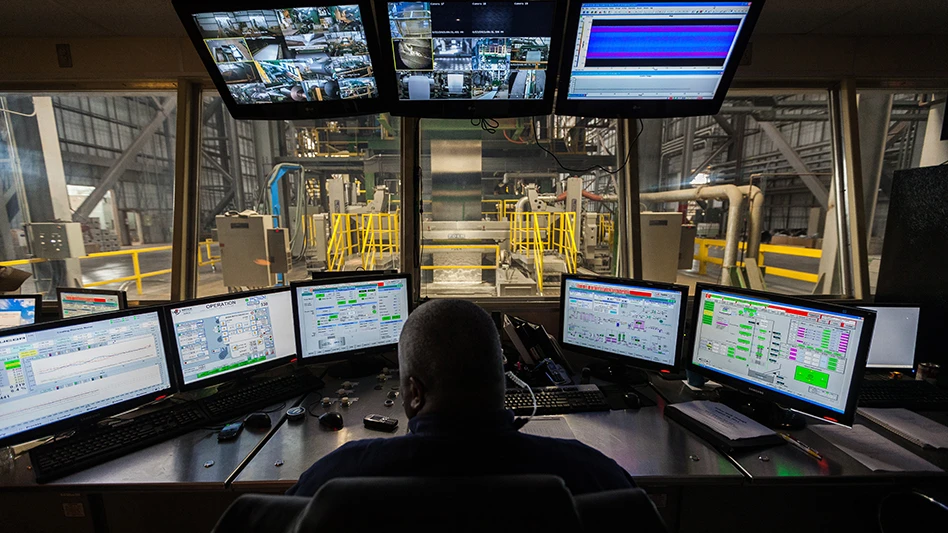
Photo courtesy of Nucor Corp.
The Global Steel Climate Council (GSCC) has certified the Science-Based Emissions Targets (SBET) set by Charlotte, North Carolina-based electric arc furnace (EAF) steelmaker Nucor Corp. for its network of recycled-content hot-rolled steel mills.
The SBET submitted by Nucor, a founding member company of the GSCC, sets a goal of reducing emissions by 2030 for its hot-rolled steel production. The target, designed to be certified later by the GSCC, covers Scopes 1, 2 and 3 emissions as defined by global emissions tracking organizations.
The submission for GSCC certification was verified independently by California-based SCS Global Services. Nucor used a 2023 base year to set an interim SBET of 0.975 metric tons of carbon dioxide-equivalent emissions (CO2e) per metric ton of hot-rolled steel produced by 2030.
Previously, Nucor set a net zero by 2050 target that entails achieving 0.116 metric tons of CO2e per metric ton of hot-rolled steel produced. Meeting that goal would make Nucor the first diversified steelmaker in the United States to set greenhouse gas (GHG) emission reduction targets that include Scopes 1, 2 and 3, according to the company.
Nucor claims it already is one of the cleanest steel producers in the world. The company’s EAF production process uses an average of nearly 80 percent recycled steel and has one-third the GHG intensity of the average blast furnace/basic oxygen furnace steelmaking process, the company says.
“Nucor is a global leader in low embodied carbon steel production, and they are proving that innovation and vision will drive the steel industry to meet the global community’s Net Zero by 2050 call to action,” says Adina Renee Adler, executive director of the Washington-based GSCC.
Nucor plans to achieve its goals by increasing the use of “clean” electricity, carbon capture and sequestration, and near-zero GHG iron making. The company also will deploy technologies designed to reduce its consumption of injection and charge carbon and will reduce the use of natural gas in its production processes.
“These targets and the certification provided by our partners at GSCC further demonstrates Nucor’s leadership in providing American-made low embodied carbon steel while also giving customers, investors and policymakers confidence in our roadmap and strategy for achieving our carbon reduction goals,” Nucor Executive Vice President Greg Murphy says.
According to Nucor, SBETs provide a pathway for companies to reduce GHG emissions, in line with the latest climate science necessary to meet the goals of the Paris Agreement.
The GSCC Steel Climate Standard was adopted by member companies in August 2023 to serve as a global standard to measure and report steel carbon emissions and provide a framework for members to seek third-party verified certification of the emissions intensity of facility-specific products.
Nucor uses recycled steel-fed EAF mills to produce carbon steel bars, beams, sheets, plates and other shapes, plus makes downstream steel products and, through its David J. Joseph Co. affiliate, collects, processes and trades ferrous and nonferrous scrap metal.
Latest from Construction & Demolition Recycling
- US Senate backs reduced cuts to EPA
- US EPA offers brownfields-related funding
- Sky Quarry seeks crowdfunding support
- Caterpillar releases the new Cat 980 GC Wheel Loader
- NAPA leaders participate in USDOT roundtable
- Yanmar CE launches full line of compact equipment
- Metso reports increased orders after flat H1
- Block Island Recycling Management Inc. aims to promote environmental stewardship





